Roommate Asks If They're Wrong To Tell Cat Owner To Do Something About Their Pet Destroying The Furniture
Being a responsible owner is already hard enough when it's just you and the pet. But at least in that situation, you only have to deal with your pet's needs.
When you're living with other people though, your responsibilities as a pet owner pile up higher because you don't have to accommodate only your needs but also the needs of your housemate or roommates. And if they tell you that your pet is bothering them in some way that is valid, you have to do something about it.
That's how respect goes for the people you live with. Unfortunately, it seems that a lot of people take their roommates for granted just like Redditor so1esister's roommate.
This roommate of theirs got a cat and it was perfectly fine with them but when the cat started clawing at everything they owned, that's when things started to go downhill. Now, other cat owners in this situation would be mortified especially if the things the cat clawed at weren't theirs but this roommate didn't seem to care.
OP and their roommates have already asked this cat owner to do something about it but did it amount to anything? Nope.
Here's the whole story.
OP asks:

The cat was cute and fun at first but then all of that changed after one week of the cat staying with them
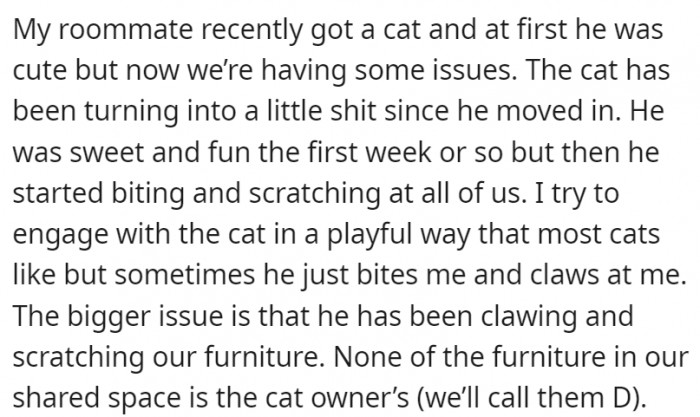
The worst part is that their roommate doesn't seem to care
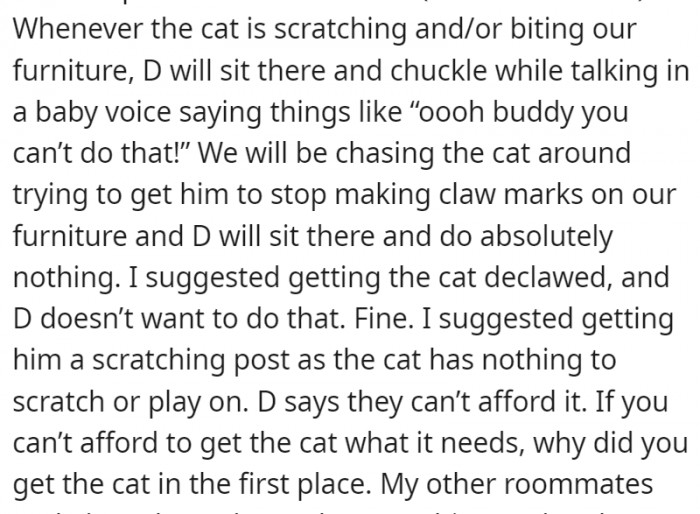
Understanding the Role of Boundaries
This scenario is a classic example of boundary violations, which can lead to significant tension in shared living situations.
Research indicates that when personal space or belongings are disrespected, it can trigger feelings of anger and resentment.
Understanding the importance of personal boundaries is essential for maintaining healthy roommate dynamics.
The Psychology of Shared Spaces
Living with roommates often brings underlying tensions to the surface, particularly regarding shared responsibilities. Dr. John Bowlby's attachment theory highlights how early relational patterns influence adult behaviors in communal living situations.
His research indicates that individuals with insecure attachment styles may struggle with compromise and communication in shared environments, leading to conflicts over responsibilities like pet care.
Even at the behest of their roommates, they refuse to take any kind of action

Having a cute cat may be fun and all but people should remember before getting one that cats have certain behaviors that can be destructive to the home if not treated appropriately. That's why they should educate themselves first about these things before getting one.
As it seems, this roommate didn't do that or wasn't interested in doing it. It seems that they also don't have that much regard for the concerns of their roommates.
Many people in the Reddit comments section were sympathetic to the other roommates. Here are the top comments.
1. The roommate needs to step up and be a better cat parent and roommate
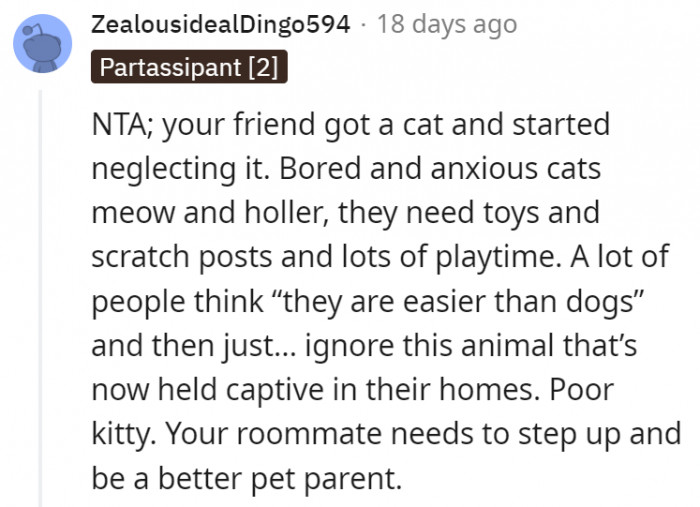
2. It's like the roommate got the cat just for the kicks of getting one

Behavioral psychology suggests that unresolved issues often lead to increased frustration, which can result in more dramatic reactions.
In this case, the roommate's repeated requests imply a growing sense of helplessness, as their environment remains chaotic.
Addressing the underlying issues directly may help in alleviating long-standing tensions.
This situation can also be viewed through the lens of social learning theory, proposed by Albert Bandura. According to this theory, behaviors are learned through observation and imitation, which means that if one roommate is neglectful, it can set a precedent for others.
Understanding these dynamics can help individuals recognize the impact of their actions on communal harmony.
3. They have the right to ask the cat owner to do something about it

4. The cat owner should be the one responsible for thinking of things to do about their cat

5. The squirt bottle seems like a brilliant idea that's harmless to the cat

The Importance of Open Communication
Effective communication is key to resolving conflicts like this one.
Research shows that when individuals feel heard and respected, they are more likely to respond positively to requests.
Encouraging both parties to engage in open dialogues about their feelings could lead to a better understanding of each other’s perspectives and needs.
The Importance of Communication
Effective communication is essential in navigating conflicts between roommates. Research from the Journal of Applied Psychology suggests that clear, direct communication reduces misunderstandings and fosters collaboration among housemates.
When addressing issues, using 'I' statements can be particularly effective, allowing individuals to express their feelings without placing blame on others.
6. The roommate needs to pay for what their cat has damaged
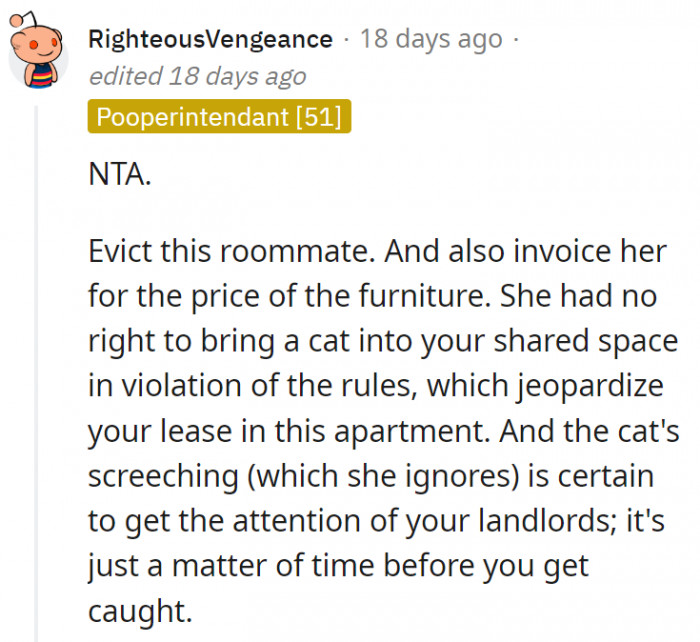
Is it?
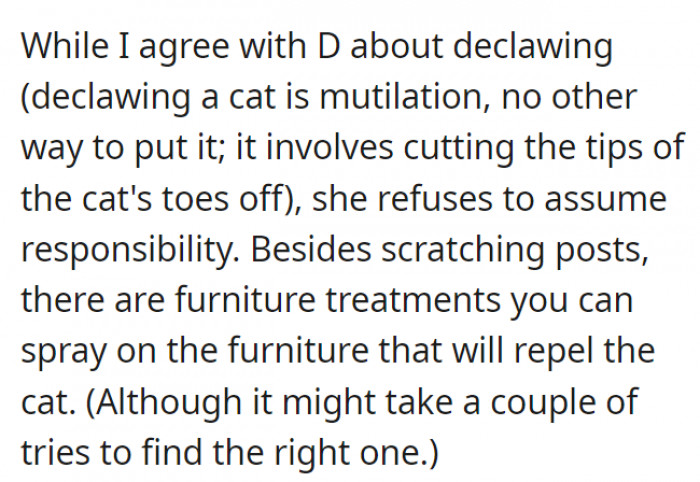
Aggressive?
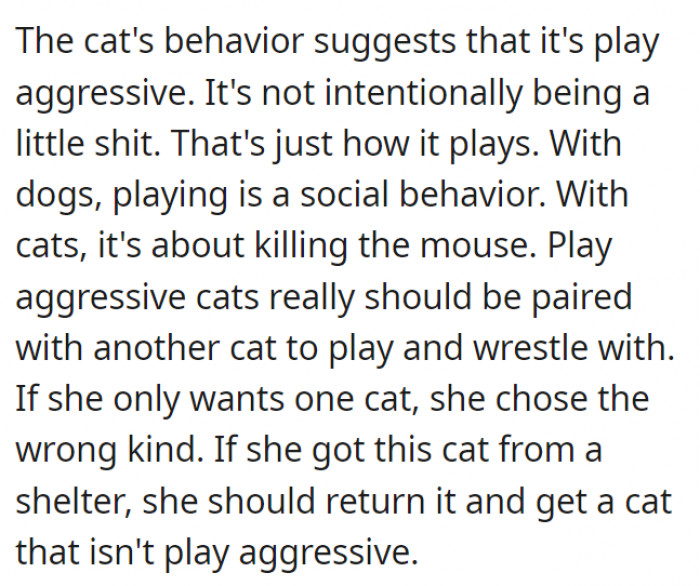
Moreover, studies have shown that creating a shared understanding of responsibilities can significantly improve living situations.
By sitting down and discussing expectations around pet behavior and household upkeep, roommates can establish clear guidelines that everyone agrees on.
This collaboration fosters a sense of teamwork and reduces feelings of isolation in handling the situation.
For instance, instead of saying 'You never take care of the cat,' one might say, 'I feel overwhelmed when the cat's needs aren’t met.' This shift not only reduces defensiveness but also encourages collaborative problem-solving.
Practicing active listening during discussions can further enhance understanding and empathy among roommates.
Spray bottle might work
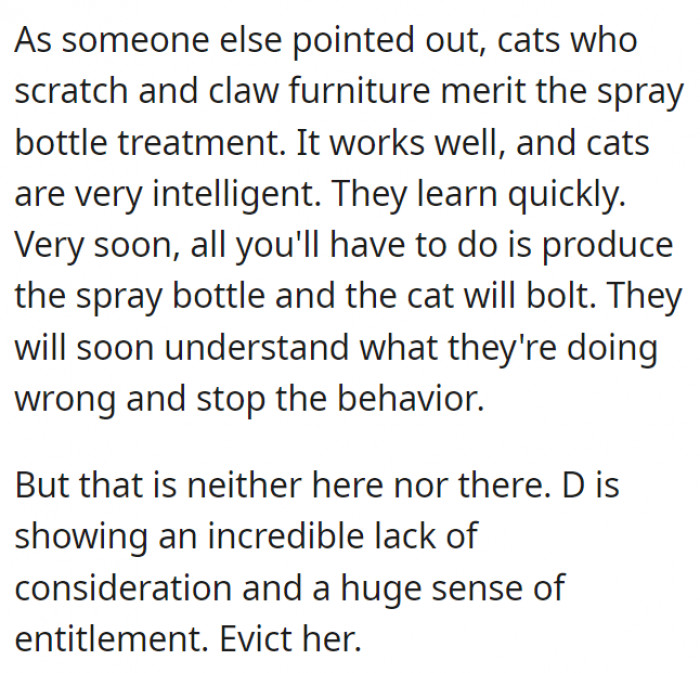
7. They should also get the cat registered with the landlord so they don't all get into trouble
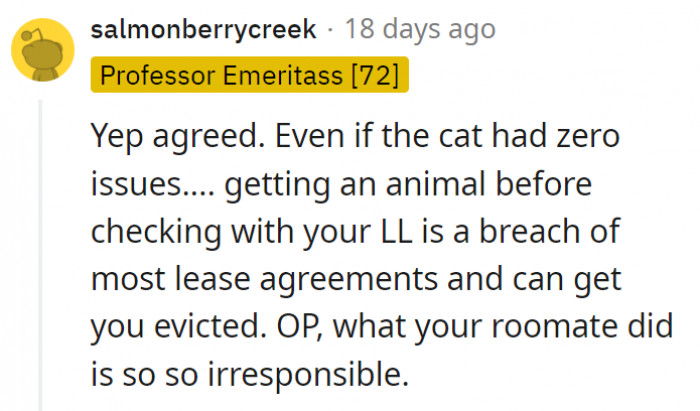
8. If they couldn't afford to get the cat everything it needs, they shouldn't have gotten one

Strategies for Positive Change
Implementing structured problem-solving techniques can also be beneficial in this context.
Research indicates that setting aside time to discuss issues calmly can lead to more effective resolutions.
Both roommates should agree on a regular check-in process where they can voice concerns in a constructive manner, promoting a healthier living environment.
Establishing Boundaries and Responsibilities
Setting clear boundaries and responsibilities is crucial in shared living situations. Dr. Judith Sills, a psychologist specializing in interpersonal dynamics, emphasizes that creating agreements about pet care and shared responsibilities can prevent resentment from building.
Her research highlights that when responsibilities are explicitly defined, individuals are more likely to adhere to them, fostering a sense of accountability.
9. Hopefully, the cat's owner would be willing to shell out a few dollars for this

10. The cat owner doesn't have the right to be indignant in this situation

The roommate is irresponsible

Additionally, addressing the emotional aspects of this situation is crucial.
Studies have demonstrated that pets can evoke strong emotional responses, and feelings of frustration may arise not just from the pet's actions but from the stress of cohabitation.
Encouraging the roommate to express their feelings and frustrations in a safe space can help mitigate the emotional weight of the situation.
One effective strategy is to hold a house meeting at the beginning of each month to discuss and assign responsibilities. Research shows that collaborative goal-setting not only clarifies duties but also strengthens relationships among roommates.
It may also be beneficial to utilize a shared calendar or task list that tracks pet-related duties and deadlines.
11. In addition to having the right stuff, the roommate should also know about maintenance and all that to actually make those things effective
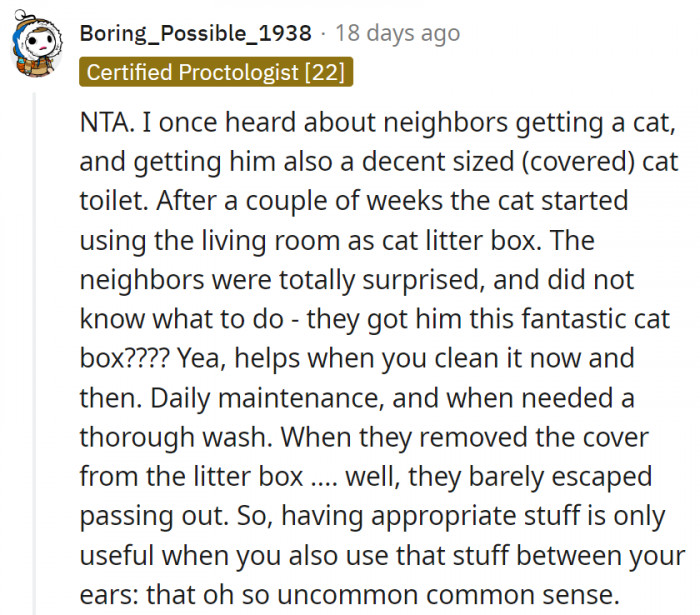
Maybe the cat should be confined
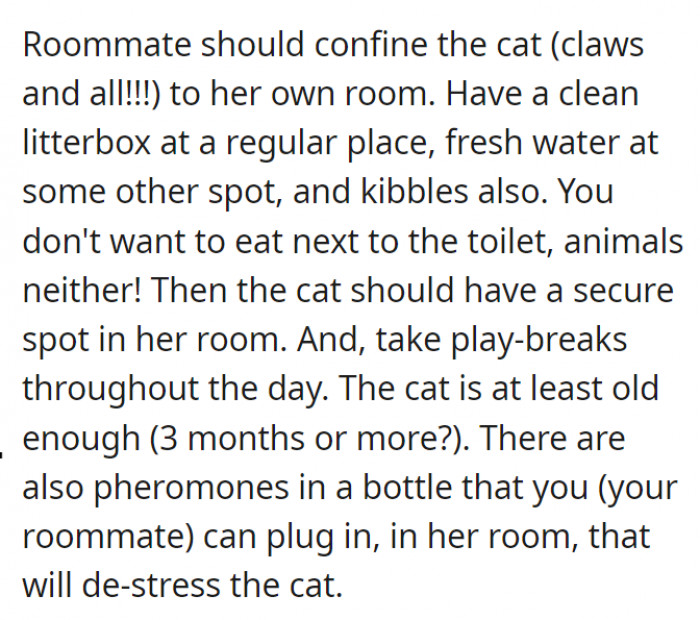
12. If nothing else changes, this might be the best solution

Empathy and Understanding
Developing empathy for one another’s situations can significantly enhance roommate relationships.
Research suggests that when individuals practice empathy, they can foster meaningful connections and reduce conflict.
Encouraging both parties to consider each other's perspectives may lead to a more harmonious living arrangement.
Developing Empathy and Understanding
Developing empathy towards one another's situations is vital in any living arrangement. Dr. Brené Brown's research on vulnerability teaches that understanding each other's perspectives—especially when it comes to shared responsibilities—can deepen relationships.
Her findings suggest that empathy fosters connection, reducing conflict and promoting a collaborative spirit.
13. Nobody in that household has the experience or know-how of taking care of a cat

Serious talk needed
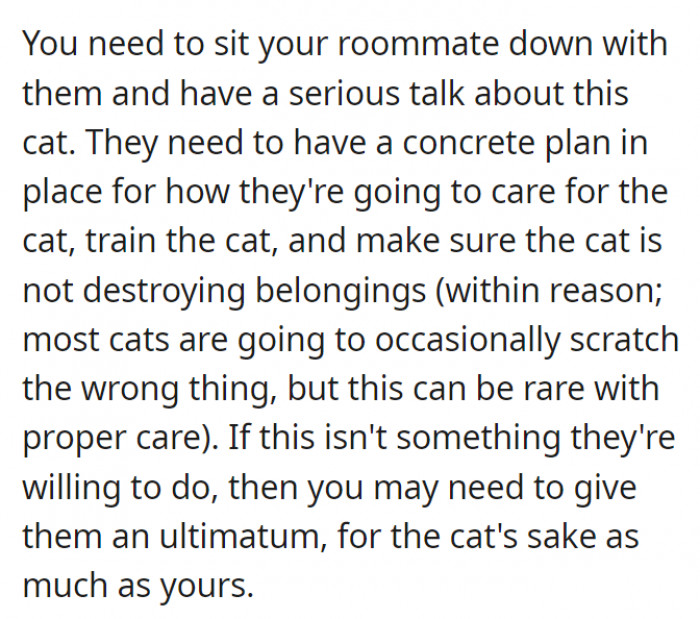
14. The cat owner should have been ready to provide the needs of the cat before getting the cat

Ultimately, addressing behavioral issues in shared spaces requires patience and understanding.
Studies indicate that improving interpersonal skills can lead to more effective conflict resolution.
Roommates should consider taking workshops or engaging in discussions that promote understanding and cooperation around shared responsibilities.
Practicing empathy can involve asking questions to understand a roommate's perspective better. For example, if a roommate seems overwhelmed, checking in with them can foster an environment of support and collaboration.
This approach not only improves communication but can also enhance overall roommate dynamics.
15. The roommate should've thought twice about getting that cat

16. Training their cat is entirely their responsibility

17. The poor cat sounds bored to death

The Role of Accountability
Lastly, accountability plays a crucial role in maintaining healthy relationships.
Research shows that when individuals take responsibility for their actions, it leads to greater trust and respect.
Encouraging the cat owner to acknowledge their role in the situation may promote a more cooperative atmosphere.
Long-Term Solutions for Roommate Harmony
Long-term harmony among roommates often requires ongoing effort and adaptive strategies. Research from the Journal of Social Issues indicates that maintaining open lines of communication and being willing to renegotiate responsibilities as needed leads to healthier living arrangements.
Regular check-ins can help address issues before they escalate into larger conflicts.
Easy:

18. Cats need to scratch and unless they're given something to scratch, they will scratch on what they can
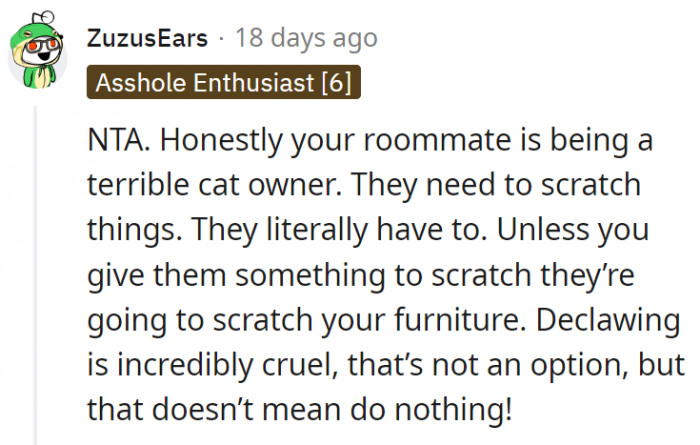
These things can help:
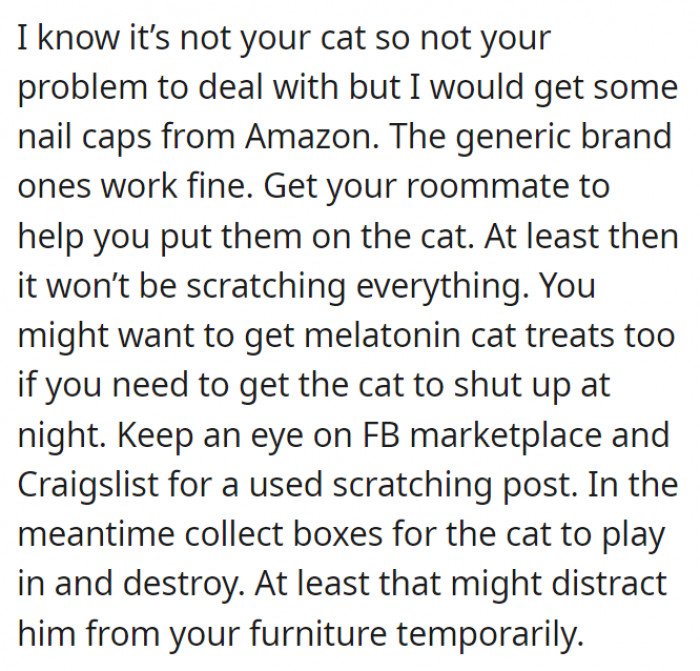
Having a cat is great. They're pretty great pets and they can also be highly affectionate when they want to be.
Before getting one, however, you have to be prepared to provide them with everything they need including toys, food, vitamins, and the like. They need these things to be happy so that they won't become trouble for you or your housemates.
Hopefully, this cat's owner and his roommates can talk something out to make the poor kitty's life comfortable in their home without it troubling them much.
Psychological Analysis
This scenario illustrates a common friction point in shared living environments, where individuals often struggle with balancing personal needs against group dynamics. The challenge often lies in effective communication and mutual understanding, which are vital for maintaining harmony in communal spaces.
Analysis generated by AI
Analysis & Alternative Approaches
In conclusion, understanding the psychological principles at play in shared living situations can lead to more harmonious relationships among roommates.
Effective communication, empathy, and clear expectations are essential components for success.
Analysis & Alternative Approaches
Research by Dr. Alexandra Solomon, a relationship therapist, highlights that "clear communication and setting boundaries are essential for harmonious living situations." By fostering empathy and understanding, roommates can create a supportive living environment that benefits everyone. As Dr. Brené Brown, a vulnerability researcher, states, "When we share our struggles and listen to each other, we build trust and respect." Ultimately, it’s about creating mutual respect and shared responsibility.



